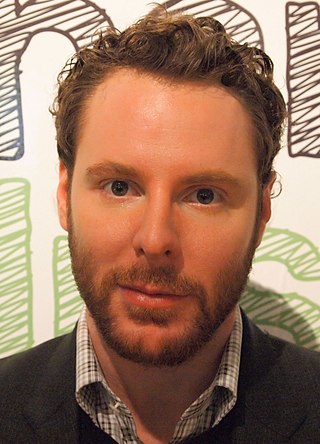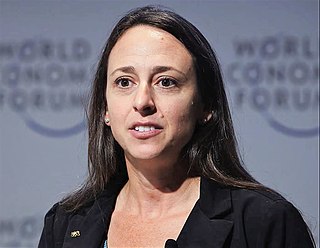
Sean Parker is an American entrepreneur and philanthropist, most notable for co-founding the file-sharing computer service Napster, and was the first president of the social networking website Facebook. He also co-founded Plaxo, Causes, Airtime.com, and Brigade, an online platform for civic engagement. He is the founder and chairman of the Parker Foundation, which focuses on life sciences, global public health, and civic engagement. On the Forbes 2022 list of the world's billionaires, he was ranked No. 1,096 with a net worth of US$2.8 billion.

Joseph Lyman DeRisi is an American biochemist, specializing in molecular biology, parasitology, genomics, virology, and computational biology.

Gladstone Institutes is an independent, non-profit biomedical research organization whose focus is to better understand, prevent, treat and cure cardiovascular, viral and neurological conditions such as heart failure, HIV/AIDS and Alzheimer's disease. Its researchers study these diseases using techniques of basic and translational science. Another focus at Gladstone is building on the development of induced pluripotent stem cell technology by one of its investigators, 2012 Nobel Laureate Shinya Yamanaka, to improve drug discovery, personalized medicine and tissue regeneration.

Jennifer Anne Doudna is an American biochemist who has done pioneering work in CRISPR gene editing, and made other fundamental contributions in biochemistry and genetics. Doudna was one of the first women to share a Nobel in the sciences. She received the 2020 Nobel Prize in Chemistry, with Emmanuelle Charpentier, "for the development of a method for genome editing." She is the Li Ka Shing Chancellor's Chair Professor in the department of chemistry and the department of molecular and cell biology at the University of California, Berkeley. She has been an investigator with the Howard Hughes Medical Institute since 1997.
The Icahn Genomics Institute is a biomedical and genomics research institute within the Icahn School of Medicine at Mount Sinai in New York City. Its aim is to establish a new generation of medicines that can better treat diseases afflicting the world, including cancer, heart disease and infectious pathogens. To do this, the institute’s doctors and scientists are developing and employing new types of treatments that utilize DNA and RNA based therapies, such as CRISPR, siRNA, RNA vaccines, and CAR T cells, and searching for novel drug targets through the use of functional genomics and data science. The institute is led by Brian Brown, a leading expert in gene therapy, genetic engineering, and molecular immunology.

Akiko Iwasaki is a Sterling Professor of Immunobiology and Molecular, Cellular and Developmental Biology at Yale University. She is also a principal investigator at the Howard Hughes Medical Institute. Her research interests include innate immunity, autophagy, inflammasomes, sexually transmitted infections, herpes simplex virus, human papillomavirus, respiratory virus infections, influenza infection, T cell immunity, commensal bacteria, COVID-19, and long COVID.

The Chan Zuckerberg Initiative (CZI) is an organization established and owned by Facebook founder Mark Zuckerberg and his wife Priscilla Chan with an investment of 99 percent of the couple's wealth from their Facebook shares over their lifetime. The CZI is set up as a limited liability company (LLC) and is an example of philanthrocapitalism. CZI has been deemed likely to be "one of the most well-funded Philanthropies in human history". Chan and Zuckerberg announced its creation on 1 December 2015, to coincide with the birth of their first child. Priscilla Chan has said that her background as a child of immigrant refugees and experience as a teacher and pediatrician for vulnerable children influences how she approaches the philanthropy's work in science, education, immigration reform, housing, criminal justice, and other local issues.
Jeffrey A. Bluestone is the A.W. and Mary Margaret Clausen Distinguished Professor Emeritus of Metabolism and Endocrinology at the University of California, San Francisco, and was, for a number of years, an earlier executive vice chancellor and provost of that university. He began the UCSF affiliation in 2000, after earlier extended positions at the NCI-NIH, and at The University of Chicago. Bluestone earned his undergraduate and masters degrees in microbiology from Rutgers State University, and his doctoral degree in immunology from Cornell Graduate School of Medical Science. His current research is focused on understanding T cell activation and immune tolerance in autoimmunity and organ transplantation. In April 2016, he co-founded and served as the president and CEO of the Parker Institute for Cancer Immunotherapy,. In 2019, he co-founded and is Chief Executive Officer and President of Sonoma Biotherapeutics.
Chan Zuckerberg Biohub, or simply Biohub, is a nonprofit research organization. In addition to supporting and conducting original research, CZ Biohub acts as a hub and fosters science collaboration between UC Berkeley, UC San Francisco (UCSF) and Stanford. The Biohub is funded by a $600 million contribution from Facebook CEO and founder Mark Zuckerberg and his wife Priscilla Chan. It was co-led by Stephen Quake and Joseph DeRisi from its inception in 2016 until 2022, when Quake left to become president of the Biohub Network. Sandra Schmid joined as Chief Scientific Officer in 2020.

Carl H. June is an American immunologist and oncologist. He is currently the Richard W. Vague Professor in Immunotherapy in the Department of Pathology and Laboratory Medicine at the Perelman School of Medicine of the University of Pennsylvania. He is most well known for his research on T cell therapies for the treatment of several forms of cancers. In 2020 he was elected to the American Philosophical Society.

Nevan J. Krogan is a Canadian molecular and systems biologist. He is a professor and the Director of the Quantitative Biosciences Institute (QBI) at the University of California San Francisco (UCSF), as well as a senior investigator at the J. David Gladstone Institutes.
Tanja Kortemme is a bioengineering professor at University of California, San Francisco. She has been recognized for outstanding contributions in computational protein design, including energy functions, sampling algorithms, and molecules to rewire cellular control circuits. She was an inaugural Chan Zuckerberg Biohub investigator and was inducted into American Institute for Medical and Biological Engineering College of Fellows.

Anna V. Molofsky is an American psychiatrist and glial biologist. She is an associate professor in the department of psychiatry at UC San Francisco. Her lab currently studies the communication between astrocytes, microglia, and neurons to understand how these signals regulate synaptic development in health and disease.
Lisa Gunaydin is an American neuroscientist and assistant professor at the Weill Institute for Neurosciences at the University of California San Francisco. Gunaydin helped discover optogenetics in the lab of Karl Deisseroth and now uses this technique in combination with neural and behavioral recordings to probe the neural circuits underlying emotional behaviors.

Katerina Akassoglou is a neuroimmunologist who is a Senior Investigator and Director of In Vivo Imaging Research at the Gladstone Institutes. Akassoglou holds faculty positions as a Professor of Neurology at the University of California, San Francisco. Akassoglou has pioneered investigations of blood-brain barrier integrity and development of neurological diseases. She found that compromised blood-brain barrier integrity leads to fibrinogen leakage into the brain inducing neurodegeneration. Akassoglou is internationally recognized for her scientific discoveries.
Catherine Blish is a translational immunologist and professor at Stanford University. Her lab works on clinical immunology and focuses primarily on the role of the innate immune system in fighting infectious diseases like HIV, dengue fever, and influenza. Her immune cell biology work characterizes the biology and action of Natural Killer (NK) cells and macrophages.

Amy Elizabeth Herr is an American professor. She is the John D. and Catherine T. MacArthur Professor at the University of California, Berkeley, where she is attached to the Department of Bioengineering. At Berkeley she was also the founding executive director of the Bakar Bioenginuity Hub. Herr is a Chan Zuckerberg BioHub Investigator and the Chief Technology Officer of the Chan Zuckerberg Biohub Network, a fellow of both the National Academy of Inventors and the American Institute of Medical and Biological Engineering, as well as a co-founder of Zephyrus Biosciences, a biotechnology company that was acquired by Bio-Techne.
Katherine Snowden Pollard is the Director of the Gladstone Institute of Data Science and Biotechnology and a professor at the University of California, San Francisco (UCSF). She is a Chan Zuckerberg Biohub Investigator. She was awarded Fellowship of the International Society for Computational Biology in 2020 and the American Institute for Medical and Biological Engineering in 2021 for outstanding contributions to computational biology and bioinformatics.

Peter J. Turnbaugh is a microbiologist and a professor at University of California, San Francisco. He is known for his research on the metabolic activities performed by the trillions of microbes that colonize humans' adult bodies. Turnbaugh and his research group use interdisciplinary approaches in preclinical models and human cohorts to study the mechanisms through which the gut microbiome influences nutrition and pharmacology.
The Innovative Genomics Institute (IGI) is a nonprofit scientific research institute founded by Nobel laureate and CRISPR gene editing pioneer Jennifer Doudna and biophysicist Jonathan Weissman. The institute is based at the University of California, Berkeley, and also has member researchers at the University of California, San Francisco, UC Davis, UCLA, Lawrence Berkeley National Laboratory, Lawrence Livermore National Laboratory, Gladstone Institutes, and other collaborating research institutions. The IGI focuses on developing real-world applications of genome editing to address problems in human health, agriculture and climate change.











